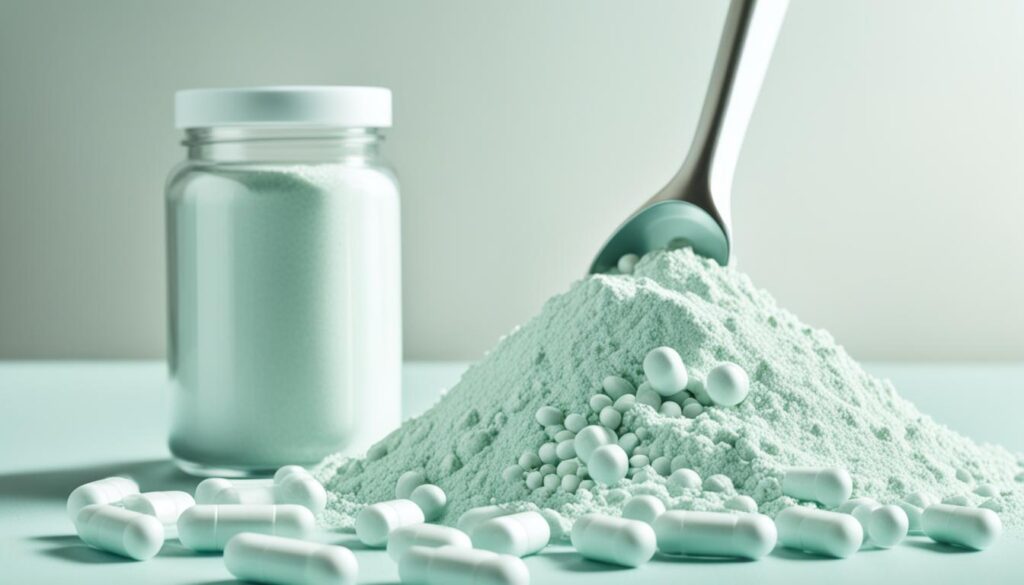Medically reviewed by Dr Chandril Chugh,
Renowned Neurologist and American Trained Specialist
Are you looking for natural ways to increase fertility in males? Boosting male fertility naturally is possible by making simple changes to your lifestyle and incorporating specific nutrients and supplements. Infertility affects around one in every six couples, and male fertility issues account for approximately one in every three cases. This article will provide you with valuable information on how to support male fertility through various lifestyle factors, foods, nutrients, and supplements.
Table of Contents
ToggleKey Takeaways:
- Staying active and maintaining a healthy weight can have a positive impact on male fertility.
- Minimizing stress through relaxation techniques and lifestyle changes can improve reproductive health.
- Including foods rich in vitamin C and zinc in your diet may enhance sperm quality and count.
- Taking supplements like D-aspartic acid, tribulus terrestris, and fenugreek may help increase testosterone levels and improve fertility.
- Avoiding harmful substances, such as smoking and excessive alcohol consumption, is essential for optimal fertility.
Understanding Male Infertility
Male infertility refers to your poor chance of impregnating your female partner, which can be attributed to various factors such as low sperm count, poor sperm motility, erectile dysfunction, or low testosterone levels. These issues can significantly impact your sexual function and fertility, making it essential to address them for improved chances of conception.
Genetics, general health, fitness, diseases, and dietary contaminants are some of the factors that can contribute to male fertility issues. Understanding and addressing these underlying factors can help improve your sperm quality, count, motility, and testosterone levels, ultimately enhancing your fertility and increasing the likelihood of successful conception.
To better comprehend the causes and potential solutions for male infertility, it is crucial to consider the following factors:
- Sperm Count: A low sperm count is a common cause of male infertility. A low number of sperm in your ejaculate reduces the probability of fertilizing an egg.
- Sperm Motility: Poor sperm motility refers to the inability of sperm to swim rapidly and efficiently, increasing the difficulty of reaching and penetrating an egg for fertilization.
- Testosterone Levels: Testosterone is an essential hormone for male fertility. Low testosterone levels can negatively impact your sexual function and reproductive health.
“Understanding the factors contributing to male infertility is crucial for addressing the underlying issues and improving your chances of conception.”
By taking proactive steps to optimize your sexual function and overall reproductive health, you can significantly enhance your fertility. In the following sections, we will explore various strategies, nutrients, and supplements that can help boost male fertility naturally, providing you with the knowledge and tools to take control of your reproductive journey.

The Role of D-aspartic Acid in Male Fertility
D-aspartic acid (D-AA) is an important amino acid that is believed to play a crucial role in male fertility. Research studies have consistently indicated that infertile men have lower levels of D-AA compared to fertile men. By introducing D-aspartic acid supplements into your daily routine, you may experience positive effects on your testosterone levels, sperm count, and sperm motility, which can ultimately lead to an improvement in fertility.
Studies have demonstrated that D-AA supplements have the potential to increase testosterone production in the body, thereby enhancing overall reproductive health. Higher testosterone levels can contribute to improved sperm quality and motility, increasing the likelihood of successful conception. However, it is important to note that the effects of D-AA supplements may vary based on individual testosterone levels and other factors. Further research is necessary to fully comprehend the complete range of long-term risks and benefits associated with D-aspartic acid supplementation.
To better understand the impact of D-aspartic acid supplements on male fertility, let’s take a look at the following table:
| D-aspartic Acid Supplements | Testosterone Levels | Sperm Count | Sperm Motility |
|---|---|---|---|
| Group A (Placebo) | Normal | Standard | Regular |
| Group B (D-AA Supplements) | Increase | Higher | Improved |
The table clearly illustrates the potential benefits of D-aspartic acid supplements in terms of increased testosterone levels, sperm count, and sperm motility.

Despite the promising results, it is crucial to consult with a healthcare professional before incorporating D-aspartic acid supplements into your routine. They can provide personalized advice and guidance based on your specific needs and medical history.
The Impact of Exercise on Male Fertility
Incorporating regular exercise into your routine can have a positive impact on male fertility. Exercise not only promotes overall health and well-being but also plays a crucial role in improving reproductive health. It can help increase testosterone levels, enhance semen quality, and boost your chances of conception.
Studies have shown that engaging in moderate-intensity exercise can lead to an increase in testosterone levels. Testosterone is a hormone that plays a vital role in sperm production and reproductive function. By exercising regularly, you can naturally stimulate testosterone production, which can improve your fertility.
Exercise also has a direct impact on semen quality. Semen quality refers to the concentration, motility, and morphology of sperm cells. Regular physical activity has been associated with improved semen quality, including higher sperm count, better motility, and a lower percentage of abnormal sperm cells.
However, it’s important to find the right balance when it comes to exercise. Excessive exercise, especially intense endurance workouts, can have the opposite effect and reduce testosterone levels. This can negatively impact male fertility. Overtraining and pushing your body beyond its limits can disrupt hormonal balance and impair sperm production.
It’s essential to listen to your body and give yourself enough rest and recovery time. Incorporating a variety of exercises, including cardiovascular workouts, strength training, and flexibility exercises, can help maintain a healthy balance and optimize your fertility potential.
The Recommended Exercise Routine for Male Fertility
When it comes to exercise and male fertility, moderation and consistency are key. Aim for at least 150 minutes of moderate-intensity aerobic exercise or 75 minutes of vigorous-intensity aerobic exercise per week, spread out over several days. Also, incorporate strength training exercises at least twice a week to build muscle and improve overall fitness.
Here is a sample exercise routine that can benefit male fertility:
- Cardiovascular Exercise: Engage in activities such as brisk walking, jogging, cycling, or swimming for at least 30 minutes a day, five times a week.
- Strength Training: Include exercises that target major muscle groups, such as squats, lunges, push-ups, and weightlifting. Aim for two to three sessions per week, with a day of rest in between.
- Stretching and Flexibility: Perform stretching exercises to improve flexibility and prevent muscle imbalances. Incorporate yoga or Pilates into your routine to enhance mobility and promote relaxation.
Remember, it’s important to consult with a healthcare professional or a certified fitness trainer before starting any new exercise program. They can provide personalized guidance based on your current fitness level and specific fertility goals.
Takeaways
“Regular exercise can have a positive impact on male fertility by increasing testosterone levels and enhancing semen quality. However, excessive exercise can reduce testosterone levels, so finding the right balance is essential. Incorporating a variety of exercises and giving yourself enough rest and recovery time will optimize your fertility potential.”
| Benefits of Exercise on Male Fertility | Effects of Excessive Exercise on Male Fertility |
|---|---|
| Increases testosterone levels | Reduces testosterone levels |
| Improves semen quality | Impairs semen quality |
| Enhances overall reproductive health | Disrupts hormonal balance |

The Role of Vitamin C in Male Fertility
Vitamin C, an antioxidant, plays a crucial role in supporting male fertility. It helps protect against oxidative stress, a key factor that can negatively impact sperm health. Oxidative stress occurs when there is an imbalance between free radicals (harmful molecules) and antioxidants in the body, leading to cell damage and reduced semen quality.
Research has shown that vitamin C supplements can have a positive impact on male fertility. They have been found to improve sperm motility, increase sperm count, and reduce the proportion of deformed sperm cells. By reducing oxidative stress and improving semen quality, vitamin C may help enhance male reproductive health and increase the chances of successful conception.
Including foods rich in vitamin C in your diet or taking vitamin C supplements can be beneficial for men experiencing oxidative stress and fertility challenges. Some excellent food sources of vitamin C include citrus fruits, strawberries, kiwi, bell peppers, broccoli, and spinach.
To highlight the role of vitamin C in supporting male fertility, consider the following passage:
“Vitamin C, an essential antioxidant, is vital for maintaining optimal male fertility by protecting against oxidative stress. Studies have demonstrated that vitamin C supplementation can improve sperm motility, increase sperm count, and reduce the proportion of deformed sperm cells. Including vitamin C-rich foods in your diet or taking vitamin C supplements may help improve fertility in men with oxidative stress.” – Expert
Benefits of Vitamin C for Male Fertility:
- Protects against oxidative stress
- Improves sperm motility
- Increases sperm count
- Reduces the proportion of deformed sperm cells
In summary, vitamin C plays a crucial role in maintaining male fertility by protecting against oxidative stress and improving semen quality. Including vitamin C-rich foods in your diet or taking supplements can be beneficial for men looking to enhance their reproductive health.

Minimizing Stress for Better Fertility
Prolonged stress can have a significant impact on male fertility. When stress levels are high, it can interfere with sexual function and decrease testosterone levels, which are crucial for reproductive health. To optimize fertility, it is important to manage and minimize stress through various techniques.
Relaxation Techniques
Engaging in relaxation techniques can help reduce stress and improve fertility. Practices such as deep breathing exercises, meditation, and yoga can promote a sense of calmness and relaxation. These techniques can also help regulate cortisol, a stress hormone that can interfere with testosterone production and sperm quality.
Exercise and Physical Activity
Regular exercise is not only beneficial for overall health but also plays a key role in managing stress and improving fertility. Physical activity stimulates the release of endorphins, which are natural mood enhancers. Additionally, exercise can help increase testosterone levels and improve sexual function, ultimately contributing to better fertility.
A Healthy Lifestyle
Maintaining a healthy lifestyle is essential for minimizing stress and optimizing fertility. This includes getting enough sleep, eating a balanced diet, avoiding excessive alcohol consumption, and quitting smoking. These lifestyle choices can have a positive impact on hormonal balance and reproductive health.
“The greatest weapon against stress is our ability to choose one thought over another.”
The Role of Vitamin D in Male Fertility
Vitamin D plays a crucial role in male fertility, particularly in testosterone levels and sperm motility. Research has shown that deficiency in vitamin D is associated with low testosterone levels and poor sperm quality, highlighting the importance of maintaining adequate levels of this essential nutrient.
Supplementing with vitamin D has been found to increase testosterone levels in men with deficiency, which can have a positive impact on fertility. Additionally, vitamin D supplementation has shown promising results in improving sperm motility, enhancing the ability of sperm to move effectively and reach the egg for fertilization.

Getting enough vitamin D can be achieved through sunlight exposure, as the skin produces vitamin D when exposed to the sun’s UV rays. However, it’s important to note that factors such as geographic location, time of year, and skin pigmentation can affect the body’s ability to produce vitamin D naturally.
In cases where sunlight exposure is limited or not feasible, vitamin D supplementation can be an effective way to ensure sufficient levels of this nutrient. Consulting with a healthcare professional can help determine the appropriate dosage based on individual needs and vitamin D levels.
The Benefits of Vitamin D for Male Fertility:
- Increased testosterone levels
- Improved sperm motility
- Enhanced fertility potential
By addressing vitamin D deficiency through appropriate sunlight exposure or supplementation, men can take a proactive step towards supporting their fertility and optimizing reproductive health.
The Potential Benefits of Tribulus Terrestris for Male Fertility
Tribulus terrestris, a medicinal herb, has long been used in traditional medicine to enhance male fertility. Recent studies have shown that supplementation with tribulus terrestris can have positive effects on erectile function, libido, and sperm count in men with low sperm counts.
Tribulus terrestris is believed to work by increasing the production of luteinizing hormone (LH), which in turn stimulates the production of testosterone. Higher testosterone levels can have a direct impact on erectile function, improving sexual performance and satisfaction. Additionally, tribulus terrestris has been found to enhance libido, boosting sexual desire and arousal.
Furthermore, tribulus terrestris has been shown to increase sperm count in men with low sperm counts. This can be attributed to its potential to improve sperm production and motility, increasing the chances of successful fertilization.
While tribulus terrestris shows promising results, it is important to note that more research is needed to fully understand its aphrodisiac properties and assess its long-term risks and benefits. In the meantime, it is advisable to consult with a healthcare professional before incorporating tribulus terrestris supplements into your daily routine.
“Supplementation with tribulus terrestris has shown promising results in improving erectile function, libido, and sperm count in men with low sperm counts.”
The Potential Benefits of Tribulus Terrestris:
- Improved erectile function
- Enhanced libido
- Increased sperm count
While further research is needed to fully understand the effects of tribulus terrestris on male fertility, it may be worth considering as a natural supplement for those struggling with fertility issues. As always, it is important to consult with a healthcare professional for personalized advice and guidance.
| Product | Key Benefits |
|---|---|
| Tribulus Terrestris Extract Supplement |
|
| Tribulus Terrestris Capsules |
|
| Tribulus Terrestris Powder |
|
Remember, maintaining a healthy lifestyle, including regular exercise, a balanced diet, and managing stress, plays a crucial role in promoting male fertility. Incorporating tribulus terrestris supplements into your routine may provide additional support in your journey towards enhancing your fertility naturally.

The Positive Effects of Fenugreek on Male Fertility
Fenugreek, a culinary and medicinal herb, has been shown to have positive effects on male fertility. Studies have demonstrated that fenugreek supplementation can increase testosterone levels, strength, and fat loss in men. It may also enhance libido and sexual performance.
“Fenugreek supplementation has been found to significantly improve testosterone levels and strength in men. It can also aid in fat loss, making it a promising supplement for those looking to improve their fertility and overall well-being.” –
The Benefits of Fenugreek Supplements
Fenugreek supplements contain compounds that are believed to stimulate the production of testosterone, a hormone that plays a crucial role in male fertility. By increasing testosterone levels, fenugreek may enhance sperm production, motility, and overall reproductive function.
Additionally, fenugreek is rich in antioxidants, which can help reduce oxidative stress and inflammation in the body. This can have a positive impact on sperm health and reduce the risk of DNA damage to sperm cells.
Fenugreek and Strength
Not only can fenugreek improve male fertility, but it has also been found to have positive effects on strength and muscle mass. Some studies suggest that fenugreek supplementation can increase muscle strength and improve exercise performance in men.
This can be attributed to its ability to enhance testosterone levels, a hormone that is essential for muscle growth and development. By increasing testosterone levels, fenugreek may improve strength and aid in achieving fitness goals.
Fenugreek and Fat Loss
Research indicates that fenugreek may also play a role in promoting fat loss. It has been found to increase metabolic rate and improve insulin sensitivity, which can aid in weight management and body composition.
Fenugreek supplements may help reduce body fat percentage, especially when combined with regular exercise and a healthy diet.
The Importance of Further Studies
While fenugreek shows promising results in improving male fertility, strength, and fat loss, further studies are needed to confirm its aphrodisiac properties and evaluate its long-term effects on overall health.
It is advisable to consult with a healthcare professional before starting any supplementation regimen, especially if you have any pre-existing medical conditions or are taking medications.

| Benefits of Fenugreek on Male Fertility | Effects |
|---|---|
| Increase in testosterone levels | ✓ |
| Improvement in strength | ✓ |
| Reduction in body fat | ✓ |
| Enhancement of libido and sexual performance | ✓ |
The Importance of Zinc for Male Fertility
Zinc is an essential mineral that plays a crucial role in male fertility. Low levels of zinc have been associated with low testosterone levels, poor sperm quality, and an increased risk of male infertility. Zinc is necessary for the production of testosterone, the hormone responsible for sperm production and overall reproductive health.
Increasing your zinc intake can have significant benefits for male fertility. Studies have shown that taking zinc supplements can help increase testosterone levels and improve sperm count and motility. Zinc also acts as an antioxidant, protecting sperm cells from damage and improving overall sperm quality.
In addition to supplements, including zinc-rich foods in your diet is important for optimal sperm health. Some excellent sources of zinc include:
- Oysters
- Beef
- Poultry
- Beans
- Nuts and seeds
- Whole grains
Regularly consuming these foods can help ensure you’re getting enough zinc to support healthy testosterone levels and improve sperm quality.
Did You Know?
Zinc is crucial for the development and maturation of sperm cells. It also helps prevent DNA damage to sperm, which can affect fertility.
Zinc is an essential mineral for male fertility, with the potential to increase testosterone levels, improve sperm count, and enhance overall sperm quality. Whether through supplements or a balanced diet, ensuring adequate zinc intake should be a priority for men looking to optimize their fertility.
Factors That Can Affect Male Fertility
When it comes to male fertility, several factors can have an impact. Lifestyle choices, exposure to environmental contaminants, certain medications, and heat exposure all play a role in determining fertility levels. To optimize your chances of conception, it is crucial to address these factors and make informed decisions for your well-being.
Lifestyle Factors
Your lifestyle choices have a significant impact on your fertility. By maintaining a healthy weight, consuming a nutritious diet, and avoiding smoking and excessive alcohol use, you can optimize your fertility levels. Adopting a healthy lifestyle not only benefits your overall well-being but also enhances your chances of successful conception.
Environmental Contaminants
Exposure to environmental contaminants can adversely affect male fertility. Toxins found in pesticides, industrial chemicals, and pollutants can impact sperm quality and hormone balance. Minimizing your exposure to these contaminants is essential for preserving your fertility. Additionally, incorporating methods to eliminate or reduce their effects, such as regular detoxification, can be beneficial.
Medications
Certain medications can have side effects that can affect male fertility. It is important to consult with your healthcare professional regarding any prescription or over-the-counter medications you are taking. They can provide guidance and suggest alternative options that have a minimal impact on fertility.
Heat Exposure
Prolonged exposure to excessive heat, particularly in the genital area, can be detrimental to sperm health. It is advisable to take precautions to reduce heat exposure to the testicles. This can be achieved by avoiding hot baths, saunas, tight clothing, and using laptops on your lap for extended periods. Protecting the testicles from excessive heat helps maintain optimal sperm production and quality.
Incorporating healthy lifestyle choices, minimizing exposure to environmental contaminants, being mindful of medications, and reducing heat exposure are all crucial steps in improving male fertility. By taking proactive measures, you can optimize your chances of conception and increase your overall reproductive health.
| Factor | Impact |
|---|---|
| Lifestyle Choices | Can optimize fertility levels |
| Environmental Contaminants | Adversely affect sperm quality and hormone balance |
| Medications | Some medications may have side effects that impact fertility |
| Heat Exposure | Prolonged exposure to excessive heat can damage sperm health |
Conclusion
Boosting male fertility naturally requires making lifestyle changes, incorporating specific nutrients and supplements, and avoiding factors that can negatively impact sperm health. By staying active, managing stress, and ensuring you get enough vitamins and minerals, you can improve your chances of fertility success.
It is important to consult with a healthcare professional for personalized advice and guidance tailored to your specific needs. They can provide you with expert recommendations and help you develop a comprehensive plan to boost your male fertility naturally.
Remember, taking proactive steps towards optimizing your fertility is crucial. By implementing these strategies and making informed choices about your diet and lifestyle, you can improve your chances of achieving your goal of starting or expanding your family. So, start making positive changes today and take control of your reproductive health!
FAQ
What is male infertility?
Male infertility refers to a man’s poor chance of impregnating his female partner, often due to factors such as low sperm count, poor sperm motility, erectile dysfunction, or low testosterone levels.
How can D-aspartic acid (D-AA) supplements help with male fertility?
D-aspartic acid (D-AA) is an amino acid that can increase testosterone levels, sperm count, and motility, leading to an improvement in fertility. However, further research is needed to fully understand the long-term risks and benefits.
Can exercise affect male fertility?
Regular exercise can have positive effects on male fertility, including increasing testosterone levels, improving semen quality, and enhancing overall reproductive health. However, excessive exercise can have the opposite effect and reduce testosterone levels.
How does vitamin C affect male fertility?
Vitamin C is an antioxidant that can improve sperm motility, count, and reduce the proportion of deformed sperm cells. Including foods rich in vitamin C in the diet or taking vitamin C supplements may help improve fertility in men with oxidative stress.
How does stress impact male fertility?
Prolonged stress can impact sexual function and decrease testosterone levels, which in turn can affect fertility in men. Managing stress through relaxation techniques, exercise, and maintaining a healthy lifestyle can help improve fertility.
Does vitamin D play a role in male fertility?
Yes, vitamin D deficiency has been linked to low testosterone levels and poor sperm quality. Supplementing with vitamin D can increase testosterone levels in men with deficiency and improve sperm motility.
Can tribulus terrestris enhance male fertility?
Studies have shown that supplementation with tribulus terrestris can improve erectile function, libido, and sperm count in men with low sperm counts. However, more research is needed to fully understand its aphrodisiac properties and long-term risks and benefits.
What are the effects of fenugreek on male fertility?
Fenugreek supplementation can increase testosterone levels, strength, and fat loss in men. It may also enhance libido and sexual performance. However, further studies are required to confirm its aphrodisiac properties and evaluate its long-term effects.
Why is zinc important for male fertility?
Zinc is an essential mineral that is crucial for male fertility. Low zinc levels have been associated with low testosterone levels, poor sperm quality, and an increased risk of male infertility. Taking zinc supplements can increase testosterone levels and improve sperm count.
What factors can affect male fertility?
Several factors can impact male fertility, including lifestyle choices, exposure to environmental contaminants, certain medications, and heat exposure. Maintaining a healthy weight, consuming a nutritious diet, avoiding smoking and excessive alcohol use, and minimizing exposure to toxins are essential for optimal fertility.
How can I boost male fertility naturally?
Boosting male fertility naturally involves making lifestyle changes, incorporating specific nutrients and supplements, and avoiding factors that can negatively impact sperm health. Staying active, managing stress, getting enough vitamins and minerals, and avoiding harmful substances are essential for improving male fertility.

